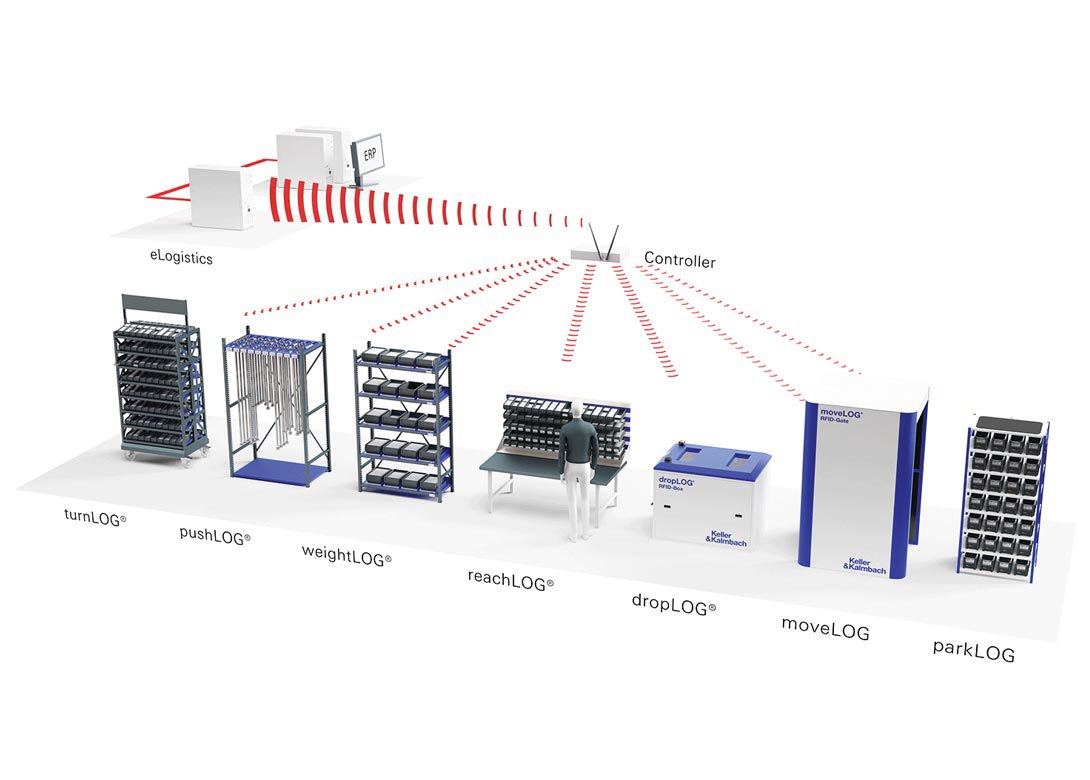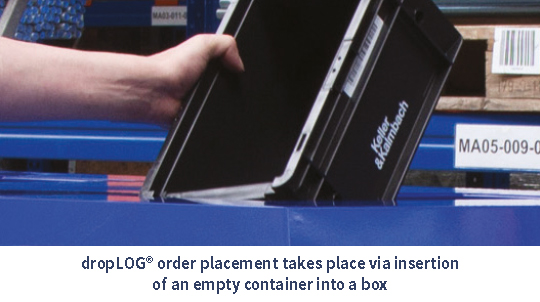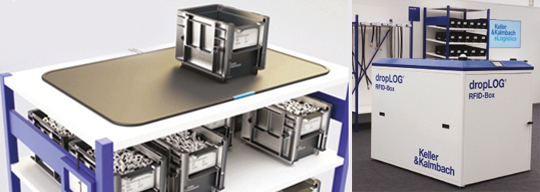
Here Keller & Kalmbach GmbH focuses on its recently introduced eLogistics, an IT-based platform for an automatic inventory management system, which enables the integration of third party suppliers and intra logistics control, plus the latest generation of Kanban systems.
C-part management and Industry 4.0
The needs in production supply are becoming ever more complex, reaction and development times ever shorter and it is more important than ever to react flexibly to new demands. The path increasingly leads to the so-called ‘Smart Factory’. It is all the more important for purchasing and logistics to create a standardised infrastructure for the business. Logistics plays a crucial role in this. Having the right products and data at the right time, in the right place, is an absolute necessity for an automated production and production supply network. The impetus for logistical processes is no longer given by large, centralised systems, but by systems that run themselves and automatically order their supplies whether it is for production or maintenance.
eLogistics is an intelligent, IT-based solution for an inventory management automation that takes precisely this approach. The platform enables control over the material and information flow, with its recurring need for parts. In eLogistics all relevant information is controlled, monitored, logged and evaluated. eLogistics recognises missing containers and defective transponders, as well as illogical orders (such as duplicate orders). Using eLogistics is an open solution, additional suppliers can be integrated into the system and material supply for multi-step production can be controlled within the plant using the pull principle. Another special feature is the bidirectional data exchange. With this, data is no longer mono directional, that is, order data usually sent from the client to the supplier, but also specifically transmitted back. So, for example, the delivery notification is signaled directly as information to the transponder, which is located, for example, in the warehouse.
Seven new logistics systems
eLogistics provides intelligent material and information management. Without logistical systems however, the ‘hardware’ consisting of shelving, containers, transponders, smart tags, data transmission units, etc – managed and provided with data by eLogistics – would not be functional. In addition to the platform, we therefore also developed the corresponding logistical systems that supports these technologies and the requirements of the customer.
“Along with our partner SFS unimarket AG in Switzerland, we have asked ourselves many questions in the past, such as what the operational requirements are for the next generation of our logistical solutions,” explains Thomas Obermeyer, managing director of Keller & Kalmbach GmbH. “Thus, it is important to know what a logistical system must actually be capable of and what type of support an industrial enterprise expects from us. We also discussed how we could support businesses to make their processes sustainably leaner and therefore create a competitive advantage.” He adds: “The result is something to be proud of.
We now offer our customers sophisticated systems for all requirements from integration of third party suppliers or control of infralogistics, tailored to the customer.”
In addition to classic supply systems, Keller & Kalmbach offers a completely new generation of Kanban solutions that communicate directly with eLogistics. These are turnLOG® 2, pushLOG® 2, reachLOG®, weightLOG®, dropLOG®, moveLOG and parkLOG. All systems are based on the newest and most innovative transmission technology.
With turnLOG need is triggered by the turning of the container. With pushLOG, which is offered for bulky articles, need is registered through pushing an order button. With reachLOG the order placement takes place via sensors that ‘pick up’ the fill level of a container. weightLOG, in contrast, ties directly to the weight of the material located in the container, which is accomplished using sensors found directly in the container.
With dropLOG the order placement takes place via insertion of an empty container into a box. With parkLOG, a container is placed on a mat that is usually found on the top shelf. moveLOG represents a demand trigger in the form of a so-called ‘bulk reading’. By passing through a door or gate with several containers on a cart or pallet, requests are triggered simultaneously for all containers. With these new systems, which can also be used in combination, all requirements for modern Kanban systems can be fulfilled today and in the future.
Big challenges for development
The challenge for companies such as Keller & Kalmbach today no longer consists only of product competences and warehousing, as well as delivery capability, but also increasingly in the technical competency that forms the foundation for the development and day-to-day operation of logistical systems.
Alongside transmission technology, aspects like sensor technology and energy efficiency also play a crucial role in the new systems. Thus, the transmission technology is based on the industry proven RFID technology, but also now supplemented with Near Field Communication (NFC) and improved with ‘low energy’ data transfer. This enables a 10 year energy self-sufficient operation of the systems.
The NFC technology, which is mostly known from private life in the form of solutions for micro payments – meaning the cashless payment of small sums is used by Keller & Kalmbach, among others, for fast ‘marriage’ of tickets and containers. This enables a fast and customer specific exchange of items without consultation with Keller & Kalmbach (or with another supplier) having to take place, since affixing a new ticket prompts an automatic registration of the altered contents of the container. Using NFC and low energy, the newest systems guarantee not only the bidirectional dispatch of data, but also energy autonomous operation.
A decisive breakthrough was also achieved in the field of sensor technology. If the previous weighing systems were above all expensive and distinguished by their inaccuracy, weightLOG, for example, now enables completely new possibilities. The weighing cells, which are no longer on the shelves but are built directly into the container, lead to maximum flexibility along with measurement precision that had seemed unattainable until now.


parkLOG® order solution via placement on a RFID mat (bottom)

Biog
Will joined Fastener + Fixing Magazine in 2007 and over the last 15 years has experienced every facet of the fastener sector - interviewing key figures within the industry and visiting leading companies and exhibitions around the globe.
Will manages the content strategy across all platforms and is the guardian for the high editorial standards that the Magazine is renowned.







